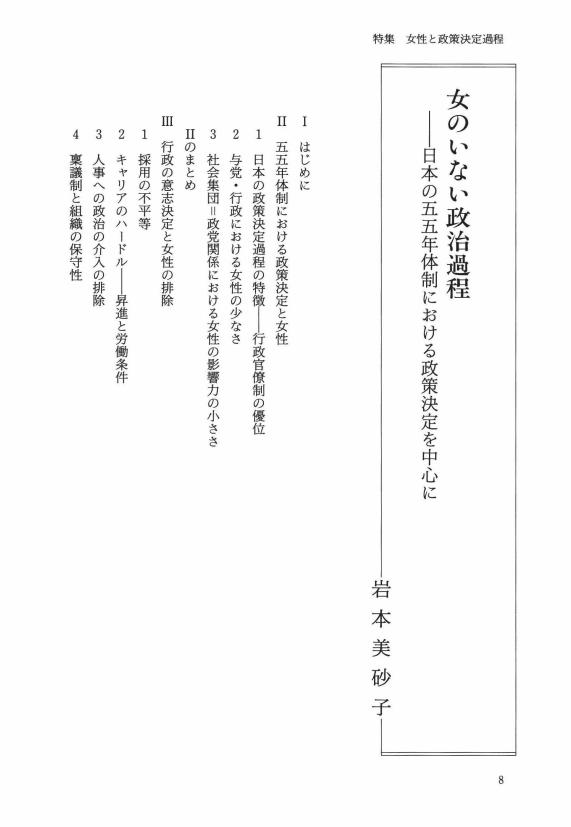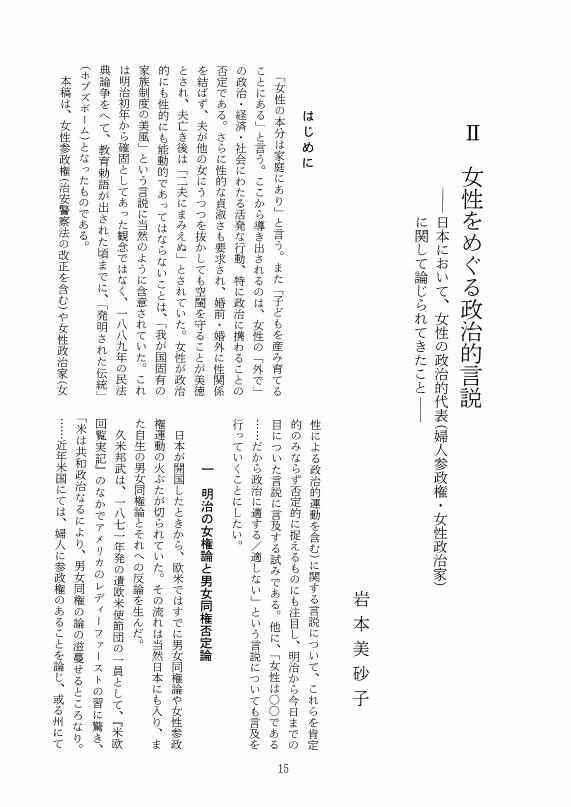35 0 0 0 OA 人工妊娠中絶政策における決定・非決定・メタ決定 --一九八〇年代日本の二通りのケースを中心に--
- 著者
- 岩本 美砂子
- 出版者
- 日本行政学会
- 雑誌
- 年報行政研究 (ISSN:05481570)
- 巻号頁・発行日
- vol.1993, no.28, pp.119-143, 1993-05-10 (Released:2012-09-24)
- 著者
- 岩本 美砂子
- 出版者
- 日本女性学会
- 雑誌
- 女性学 (ISSN:1343697X)
- 巻号頁・発行日
- no.5, pp.8-39, 1997
13 0 0 0 OA 女のいない政治過程 ―日本の五五年体制における政策決定を中心に
- 著者
- 岩本 美砂子
- 出版者
- 日本女性学会
- 雑誌
- 女性学 (ISSN:1343697X)
- 巻号頁・発行日
- vol.5, pp.8-39, 1997-12-10 (Released:2022-01-17)
11 0 0 0 OA 家父長制とジェンダー平等
- 著者
- 岩本 美砂子
- 出版者
- JAPANESE POLITICAL SCIENCE ASSOCIATION
- 雑誌
- 年報政治学 (ISSN:05494192)
- 巻号頁・発行日
- vol.57, no.1, pp.171-205,316, 2006-11-10 (Released:2010-04-30)
The concept of gender took place of the patriarchy in the feminist discourses in the 1990s. But the word patriarchy was not very popular in Japan. The concept of patriarchy is still effective when we observe the power hierarchy between men and women. In Japan the idea of multiple discrimination has been and is so unpopular, that the country report to the CEDAW (Committee of Elimination of the Discrimination against Women of the United Nations) didn't refer to the minority women, who suffer from not only the sex discrimination but also the discrimination against diverse minorities, such as indigenous people (Ainu and Ryukyu), foreign people (old comers: Koreans and Taiwanises whose ancestors came to Japanese main land when their lands were Japanese colonies, and new comers: especially Asian people and the descendants of Japanese planters in Latin American countries), people who are called Burakumin, disabled people and so on.In 2001, the first DV Act in Japan was enacted as a private members' bill owing to efforts of the women senators of the Research Committee of the Diverse Society. But it had many loopholes. In 2003, the revision of the Act started. Some survivors (of violence), volunteers supporting them, women lawyers and women scholars of legal studies presented their criticism to the project team members of the Research Committee of the Diverse Society in the senate. The cause of special consideration for the foreign and disabled survivors is included in the second DV Act in 2004. The reason of it is partly the presser from the CEDAW in July 2003, criticizing the Japanese country reports for no reference to any kind of minority women.Some foreign women depend on their Japanese husbands to renew their visa as the spouses of Japanese people. Without any visa, not only failing the renewal of the spousal visa or other visa such as for entertainers, they were to be reported by all kind of public servants to the Bureau of Emigration and be sent back to their home land compulsory. In the process of making the second DV Act, the chief of the Bureau of Emigration issued a notice that, according to the situation, not every case of survivors without visa have to be reported. So they became able to keep living in Japan, struggling against the gender patriarchy and the state patriarchy of the Emigrant Bureau.Many disabled married women depend on their husbands to connect themselves to the society. These survivors suffer from the difficulty in accessing information such as what is DV and supports for them. And both formal and informal shelters are of ten built with physical barriers. The introduction of the consideration clause and the prefectual basic plan helps and will help the disabled survivors to ride out the gender patriarchy and the hierarchy between ordinal and disabled people.The modern state is not always a monolithic patriarchal entity. But it still keeps some patriarchal moment. The DV Act in 2004 is a challenge to defend the equality not only between majority men and women but between majority and minority people, destroying the multiple patriarchies.
4 0 0 0 OA 日本における女性大臣
- 著者
- 岩本 美砂子 Iwamoto Misako
- 出版者
- 三重大学法律経済学会
- 雑誌
- 三重大学法経論叢 = The Journal of law and economics (ISSN:02897156)
- 巻号頁・発行日
- vol.38, no.2, pp.1-40, 2021-03-20
- 著者
- 岩本 美砂子
- 出版者
- 三重大学社会科学学会
- 雑誌
- 三重大学法経論叢 (ISSN:02897156)
- 巻号頁・発行日
- vol.25, no.2, pp.1-20, 2008-03-01
2 0 0 0 女性と政治的リクルート機関としての政党についての比較研究
本研究にあたり、比較研究の基礎となる日本の現状の先行研究が無に等しいことに直面した。そこで日本における女性の政治的リクルートの歴史と現状を把握するべく、女性国会議員およびOGへの面接調査と政党の機関誌紙の調査を行った。1980年代後半の「マドンナ・ブーム」に関して、社会党の従来の労組兼務議員のリクルートが困難になったことから、女性候補が注目された点を解明した。しかし党内で女性候補抜擢が組織的になったのではなく、マスメディアによる「土井ブーム」という風が女性候補を後押ししたのだった。が、このブームは、「女性にとって政治は遠い」という既成概念を崩し、その後の女性候補の進出に資した。また同時期、共産党・公明党も女性候補抜擢に着手していた。さらに、1999年4月の統一地方選挙を中心に、女性の進出の背景について全国調査を行った。全国レベルで、無党派を中心とした「女性を議会へ送る」市民活動が活発化している。「ネット」運動も女性議員を増やしている。既成政党については、特に公明・共産両党が女性候補擁立に熱心であるが、党内部での候補者選抜過程は外部からは捉えがたい。アメリカの選挙は候補者中心であり、政党は女性候補に対して特別の後援を行っていないが、かつてのように女性の立候補(予備選挙における選抜)を妨害することはなくなった。英国では若い女性票が政権の帰趨を制するという見通しの元、労働党が候補者選抜過程で女性比率を維持する仕組みを制度化した。ドイツでは緑の党による候補の女性を半数にする動きが、社民党を刺激し、後者の40%が女性というクウォータを実現させた。フランスでは厚い現職の壁に対して、新設の欧州議会や地域圏議会に女性が進出しており、社会党が熱心に女性候補を選抜している。2000年制定のパリテ法(男女衡平法)により、2001年統一地方選挙にむけ、各党が女性候補発掘に追われている。
- 著者
- 岩本 美砂子
- 出版者
- 三重大学社会科学学会
- 雑誌
- 三重大学法経論叢 (ISSN:02897156)
- 巻号頁・発行日
- vol.25, no.2, pp.1-20, 2008-03
- 著者
- 岩本 美砂子 Iwamoto Misako
- 出版者
- 三重大学社会科学学会
- 雑誌
- 三重大学法経論叢 (ISSN:02897156)
- 巻号頁・発行日
- vol.24, no.2, pp.1-40, 2007-03
1 0 0 0 OA 女性をめぐる政治的言説
- 著者
- 岩本 美砂子
- 出版者
- JAPANESE POLITICAL SCIENCE ASSOCIATION
- 雑誌
- 年報政治学 (ISSN:05494192)
- 巻号頁・発行日
- vol.54, pp.15-44, 2003-12-25 (Released:2009-12-21)
- 被引用文献数
- 1


